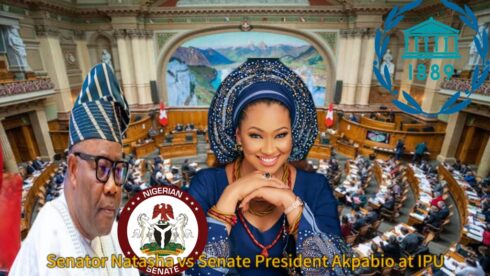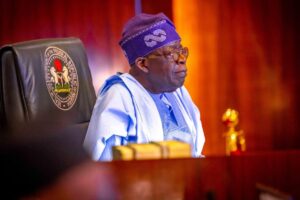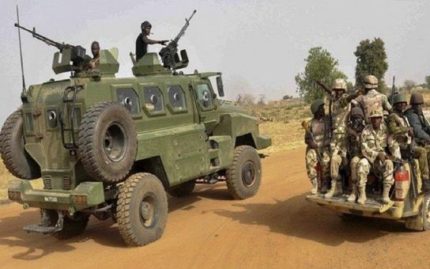In a significant development, the National Human Rights Commission (NHRC) has exonerated the Nigerian military of grave accusations made by Reuters. In a series of reports published in December 2022, the international media agency alleged that the military was engaged in a “secret abortion program” as part of its counter-insurgency operations in Nigeria’s North-East. The NHRC, through a special investigative panel formed on February 8, 2023, conducted an extensive review, ultimately concluding that the military was not involved in any such program.
The panel’s findings were submitted in Abuja by the panel’s Secretary, Mr. Hilary Ogbonna. He emphasized that despite the weighty allegations, the investigation revealed no evidence to substantiate Reuters’ claims. Ogbonna also noted the challenges encountered, including Reuters’ refusal to cooperate with the investigation and the lack of support from international organizations like the Red Cross, which impeded certain aspects of the inquiry.
Overview of Reuters’ Three-Part Allegations
Reuters had asserted that the Nigerian military was responsible for over 10,000 abortions in a program targeting women and girls who were allegedly impregnated by Boko Haram insurgents. This claim, Reuters argued, was part of a broader scheme to eliminate offspring linked to the insurgents. The first allegation highlighted a secret abortion program, allegedly resulting in thousands of terminated pregnancies. The second focused on accusations that the military executed operations targeting children, purportedly killing them in attempts to neutralize threats associated with insurgency.
The third allegation, described as “A War on Women,” claimed that the military implemented an illegal program since 2013 aimed at terminating pregnancies resulting from Boko Haram fighters. Reuters portrayed these alleged actions as systematic, state-sanctioned operations, designed to curb the insurgent threat by preventing the birth of future combatants. However, the NHRC panel’s investigation dismissed these claims, finding no credible evidence to substantiate Reuters’ portrayal of the military’s actions in the region.
Independent Panel’s Methodology and Findings
The NHRC’s seven-member panel, led by retired Justice Abdu Aboki, conducted an 18-month investigation involving 199 testimonies and site visits to 20 field locations across the North-East. The panel also examined hospital and military records and interviewed civilians impacted by counter-insurgency operations. Aboki highlighted that the investigative process provided an in-depth examination of the military’s conduct in conflict areas, with the report setting forth key aspects for advancing Nigeria’s human rights accountability mechanisms.
Justice Aboki noted that the absence of collaboration from Reuters, the International Committee of the Red Cross, and Medecins Sans Frontieres posed obstacles to a comprehensive investigation. Despite these challenges, the panel was able to complete a detailed report, offering both clarity and actionable recommendations to improve transparency and accountability in military operations in Nigeria’s North-East.
NHRC’s Vision for Human Rights in Military Operations
The NHRC’s Executive Secretary, Dr. Anthony Ojukwu, SAN, commended the panel’s work, underscoring the importance of upholding human rights principles within military operations. According to Ojukwu, the panel’s findings underscore the need for a framework that protects civilians, particularly women and children, in conflict zones. He highlighted that the panel’s recommendations serve as a catalyst for multi-stakeholder partnerships in Nigeria’s humanitarian response.
Dr. Ojukwu reiterated the NHRC’s commitment to implementing the panel’s recommendations, emphasizing that this report will shape future human rights protocols within counter-insurgency efforts. He called on stakeholders, including UN agencies and NGOs present at the report’s presentation, to collaborate with the NHRC in integrating human rights protections into Nigeria’s security landscape. The panel’s report, he noted, reflects a comprehensive approach to safeguarding civilians and fostering accountability in military operations.
Reactions and Future Implications of the Panel’s Report
The panel’s report has prompted diverse reactions from national and international observers, with some NGOs and human rights groups urging the Nigerian military to adopt greater transparency. Advocates view the report as a crucial document that will guide future human rights policies, serving as a blueprint for reforms in Nigeria’s counter-insurgency practices. The NHRC and its partners are expected to intensify their efforts in protecting vulnerable populations while addressing the complexities of counter-insurgency operations.
As the report gains traction, it is expected that the Nigerian government will consider the panel’s recommendations to avoid similar accusations in the future. By establishing clearer mechanisms for accountability and civilian protection, the NHRC hopes to foster a security framework that aligns with international human rights standards, reflecting a progressive approach to addressing insurgency-related challenges in Nigeria’s North-East.
Table of Contents
Discover more from OGM News NG
Subscribe to get the latest posts sent to your email.














